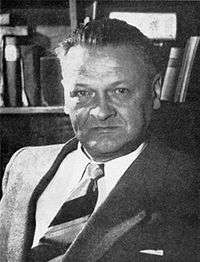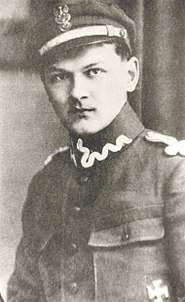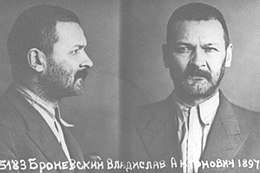Władysław Broniewski



Władysław Broniewski (December 17, 1897, Płock – February 10, 1962, Warsaw) was a Polish poet and soldier.
Life
As a young man Broniewski joined in 1915[1] the legions of Piłsudski and returned to the army just a few years later, to defend Poland against the invasion by Soviet Union. He fought in the Polish-Bolshevik War, where he fought in the Battle of Białystok.[2] He and was decorated with the order of Virtuti Militari, the highest Polish order for bravery on the battle-field.
In the 1930s, his sympathies were to the political left. In summer 1931, he was arrested during a literary meeting of writers connected with KPP (Communist Party of Poland) along with Jan Hempel and Aleksander Wat. He was helped by Bolesław Wieniawa-Długoszowski.[3]
When Poland was attacked in 1939 by Germany, he wrote an important poem encouraging Poles to put away political differences and fight the aggressors. While Poland was attacked by Soviet Union and the whole Eastern Borderlands were occupied by the Soviets, Broniewski found himself in Lwów. At first, he published his poems in the newspaper published by the Soviets, but soon he was arrested by NKVD on the trumped-up charges of "hooliganism". He refused to co-operate with NKVD and after four months transported to the Lubianka prison[4][5] in Moscow, where he spent further thirteen months. He left Soviet Union with Polish army led by general Władysław Anders and through Iran came to Iraq and then Palestine.[6] He worked at the Polish embassy in Kujbyszew (now Samara).[7]
After World War II and the establishment of the Polish People's Republic, he compromised by writing in 1951 an important politically narrative poem "Słowo o Stalinie" ("A Word about Stalin"). Subsequently, Broniewski became an important political figure and was proclaimed by the authorities as a foremost national poet. Still, Broniewski managed to obtain a certain degree of independence, and some of his poems from this period certify to his talent. He has been also a talented translator of poetry and prose, translating, among others, Dostoyevsky, Yesenin, Mayakovsky and Brecht.
During the last years of his life his health had been ruined by alcohol abuse. He died in Warsaw.
Poetry
Broniewski's poetry deals with problems of human life in context of historical events, such as wars and revolutions (for example Paris Commune[8]), and with questions of justice and injustice, fight for freedom, patriotism and personal suffering. This last aspect is evident in the cycle Anka, dedicated to the memory of tragically deceased poet's daughter Anna, who was gas-poisoned on 1 September 1954. This cycle is often compared to Jan Kochanowski's Laments. Another very important Broniewski's poem is Ballady i romanse, alluding to Adam Mickiewicz's the same name cycle. This poem is about the Holocaust. Its hero is a thirteen years old Jewish girl Ryfka, who dies together with Jesus Christ shot by the Nazis. Broniewski was conservative in the field of poetic form. He used classical forms of verse, traditional metres and stanzas. He often employed dactylic metre.[9]
Poetry collections
- Wiatraki (1925)
- Dymy nad miastem (1927)
- Troska i pieśń (1932)
- Krzyk ostateczny (1938)
- Bagnet na broń (1943)
- Drzewo rozpaczające (1945)
- Nadzieja (1951)
- Anka (1956)
Notes
- ↑ Miłość, wódka, polityka, czyli biografia Broniewskiego at PolskieRadio.pl
- ↑ Spis oficerów służących czynnie w dniu 1.6.1921 r. Dodatek do Dziennika Personalnego M.S.Wojsk. Nr 37 z 24 września 1921 r. pp. 21, 568.
- ↑ Wat, Aleksander (1990). Mój wiek. Warsaw.
- ↑ Wat, Aleksander. Mój wiek. Warsaw. p. 1990.
- ↑ Miłość, wódka, polityka, czyli biografia Broniewskiego at PolskieRadio.pl
- ↑ Władysław Broniewski (1897.12.17 - 1962.02.10) at granice.pl
- ↑ Czapski, Józef. Na nieludzkiej ziemi.
- ↑ Broniewski's poem Komuna Paryska was written in 1929. See full text at Poema.pl
- ↑ Wiktor Jarosław Darasz, Polski daktyl, Język Polski 3-4/2000, p. 257-265.
Honours and awards
- Order of the Builders of People's Poland (1955)
- Silver Cross of the Order of Virtuti Militari
- Commander's Cross with Star of the Order of Polonia Restituta
Further reading
- Broniewski, Władysław. Pamiętnik 1918–1922. Warszawa: Państwowy Instytut Wydawniczy, 1987.
External links

- Bibliowiki has original media or text related to this article: Władysław Broniewski (in the public domain in Canada)
- Władysław Broniewski at Culture.pl